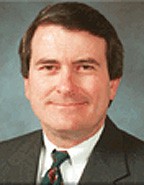
Division of journalism names new Belo chairman
SMU’s Division of Journalism has a new boss.
Tony Pederson, who has spent the past 29 years with The Houston Chronicle, was hired last week and is working to convince students and faculty that he has every intention of remaining at SMU.
“It’s tough to convince people about what’s going to happen in the future,” Pederson said in a recent interview. “It’s oftentimes difficult enough to convince people what’s happening in the present or even the past . . . If I thought there was any way that I wouldn’t be able to fulfill my obligation here, I just wouldn’t do it.”
The Belo Distinguished Chair position became vacant in 2002 when Chris Peck left to become editor of The Memphis Commercial Appeal newspaper. Since that time, a search committee has been meeting and interviewing candidates for the position.
Pederson said he is aware that much is expected of him.
“I understand there’s a lot at stake here,” he said. “It’s not like I’m coming into this from some foreign country, and I don’t understand what the issues are with both SMU and Belo. I think I understand it, and I’m not going to fail.”
Pederson, 52, speaks candidly about his reason for leaving the Chronicle. He said he decided to leave after he was not chosen as editor. Instead of continuing with the newspaper, he chose to pursue a career in education, which is what brought him to SMU a few weeks ago. Since, he has visited several journalism classes. Pederson said he wants to make sure he answers any questions students might have.
Pederson was born Oct. 27, 1950 in Waco, Texas. He received his Bachelors of Arts degree in journalism-communication at Baylor University in 1973 and his master’s degree from Ohio State University in 1976. While at Baylor, he worked as a full-time staff member for The Waco Tribune-Herald from 1970 to 1973. He then went to The Houston Chronicle where he started as a sports reporter. Over the next three decades, he worked as copy editor, news editor, sports editor, managing editor and executive editor in 2000.
Pederson acknowledges that he has relatively little teaching experience. He was a teaching assistant at Ohio State University for one year and served as an adjunct faculty member at the University of Houston from 1977 to 1979. Pederson said two things will help make up for his lack of experience: He is still a pretty good student , and he will not “fake it.” If he doesn’t know something, Pederson said he would pick up the phone and call somebody who does.
In addition, Pederson said he has the support of the entire Meadows School of the Arts, which journalism is a part of, particularly Dean Carole Brandt. “There’s an absolute commitment to help the Chair of Journalism succeed,” he said.
Pederson readily acknowledges that he has a lack of experience in broadcast journalism. To compensate for that, Pederson was quick to point out that he could learn just as the students in the department do – by getting in the studio and finding out what’s going on.
“I’ll ask the students to let me know if I’m not holding up my end on the broadcast,” Pederson said, “If they feel like they’re not getting the best broadcast education possible and learning everything they need to learn, I want to be the first to know.”
Pederson has worked for 15 years with the Inter-American Press Association, a group dedicated to freedom of the press in the Americas, and served as chair of the group’s International Committee in 2001-2002.
“When we look at journalism in this country,” Pederson said, “we’ve got an extraordinary history of press freedom which we must preserve, but that type of tradition doesn’t exist really in many other places.”
Pederson said his interest in Latin American studies would play a part in his goals for the department. He hopes to begin a class in international journalism.
Pederson, a fluent speaker of Spanish, said, “It’s been a great passion of mine for a number of years and continues to be.”
Many students believe the department has a great deal of potential.
“I had heard a lot about SMU’s journalism department before coming here and that was a big draw for me,” sophomore broadcast journalism major Emily Robards said.
“In my two years here I’ve seen enormous growth with the addition of the all-digital newsroom,” she said. “I’m excited about the direction the department is going and can’t wait to get into the classes where I work with the equipment hands-on.”
Pederson has numerous goals for the department. He wants to start a hands-on photojournalism course. More importantly, he wants to emphasize the basics of good journalism – strong reporting, clear writing and the critical thinking needed to understand and know what news stories are.
He said that many students go into journalism to become a columnist.
“That’s great, they ought to be a columnist, but first they’ve got to cover hard news,” Pederson said. “If a student can’t do that, they’re never going to be able to sustain themselves as a columnist or a feature writer or anything else. So I want to make absolutely certain that that commitment to news is there and it has to be taken into consideration whether a student’s interested in print, broadcast, or Web. The foundation of our plan is that there are basics that don’t change.”
Pederson says students will be the heart of the journalism department.
“If a university is not known for it’s students,” he said, “it shouldn’t be known for anything else.”








